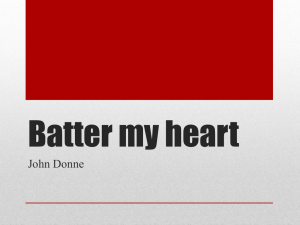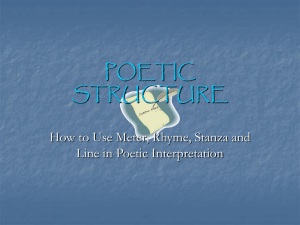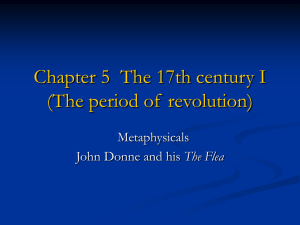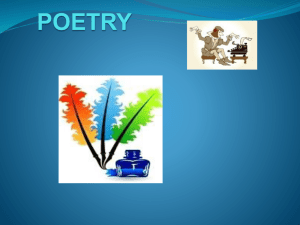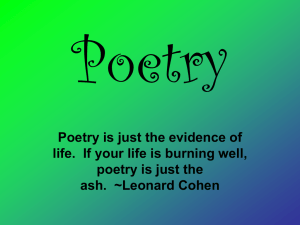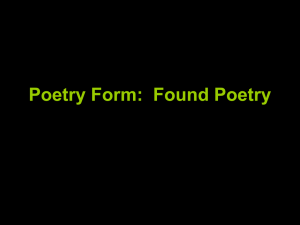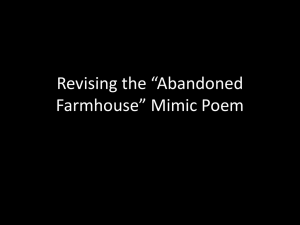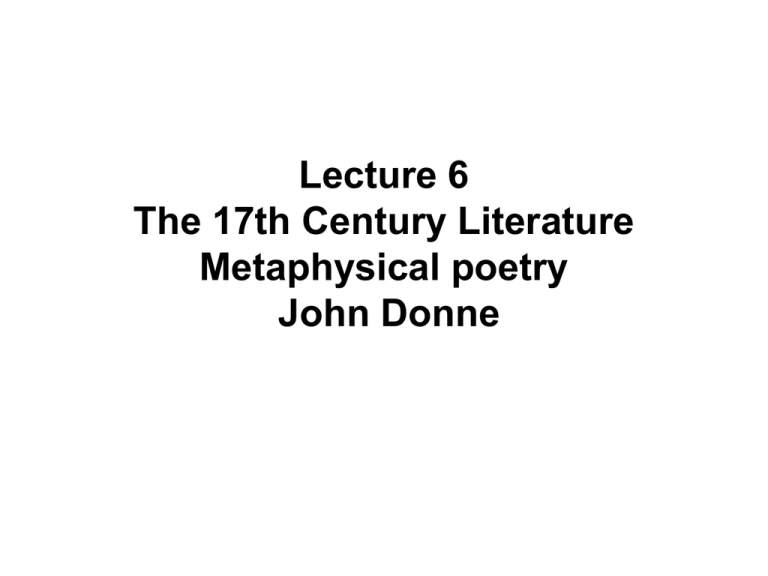
Lecture 6
The 17th Century Literature
Metaphysical poetry
John Donne
Part One The 17th century literature
• I. The Weakening of the Tie Between Monarchy and
Bourgeoisie:
Until about 1590, the bourgeoisie had many interests in
common with those of the monarchy in the struggles
against Spain, against the Roman Catholic Church,
against noble houses ruining the country with their civil
wars.
But when all its internal and external foes had been
crushed, the bourgeoisie ceased to depend upon the
protection of the monarchy. At the same time the Crown
strove to consolidate its position before it was too late.
• II. The clashes Between the King and Parliament
1.The major parliamentary clashes of the early 17th century were over
monopolies.The king granted monopolies on such and such
merchandises to his favourites. This caused grave inconvenience to
merchants and a sharp rise in prices. And monopolies were
extended in the reigns of James I and Charles I.
2. the Parliament declared that monopolies without its consent were
illegal.
3. Charles I dissolved it in 1629. For eleven years Charles ruled the
country with an absolute government. He relied upon the prerogative
Courts ( the Star Chamber, etc.) as the instruments of his policy.
Severe persecutions hit the capitalist class as a whole.
4.Thus arose the demand for a new government on the part of the
English bourgeoisie.
III. The Outburst of the English Revolution
1.
2.
3.
4.
5.
A civil war broke out in 1642 and lasted till 1649.
Oliver Cromwell (1599-1658), the famous opposition
leader, reorganized the Parliamentary forces into the
New Model Army.
the Army advanced rapidly to victory and the Royalists
were decisively routed in Naseby in 1645. The war
soon ended and Charles was captured.
But he escaped from captivity, and civil war broke out
again until the King was re-captured and executed in
1649.
Monarchy was abolished. England was declared a
commonwealth, i.e., a republic.
IV. The influences of the English Revolution
1. English Revolution was some times called the
Puritan Revolution.
2. Puritanism was the religious doctrine of the
revolutionary bourgeoisie during the English
Revolution.
3. It preached thrift, sobriety, hard work and
unceasing labour.
4. Worldly pleasures were condemned as harmful.
The Puritans opposed the old church.
5. They closed down the London theatres in 1642.
• VI. "Glorious Revolution”
• After the death of Cromwell, the Parliament recalled
Charles II to England in 1660. Then followed the
Restoration period. Many Republicans were put to death.
But the big bourgeoisie was more afraid of the people’s
revolution than of the King’s reaction. the bourgeoisie
invited William, Prince of Orange, from Holland, to be
King of England. in 1688. This was the so-called
"Glorious Revolution”,”glorious” because it was
bloodless and there was no revival of the revolutionary
demands. So, after a century of disputes and battles, the
state structure of England was settled, within which
capitalism could develop freely.
VII. Literature of the Revolution Period
• The spirit of unity, and the feeling of patriotism ended
with the reign of Elizabeth and England was then
convulsed with the conflict between the two antagonistic
camps, the Royalists and the Puritans. English literature
of this revolution and restoration period was very much
concerned with the tremendous social upheavals of the
time. Milton, one of the greatest poets of England,
defended the English Commonwealth with his pen. Even
after the Restoration in 1660, Milton and Bunyan, the
poor tinker-writer, continued to defend in their works the
ideals of the Revolution, "the good old cause", and
expose the reactionary forces.
Part Two Metaphysical Poetry
2.1. Metaphysical poetry
• Highly intellectualized poetry written chiefly in
17th-century England. Less concerned with
expressing feeling than with analyzing it,
Metaphysical poetry is marked by bold and
ingenious conceits (e.g., metaphors drawing
sometimes forced parallels between apparently
dissimilar ideas or things), complex and subtle
thought, frequent use of paradox, and a
dramatic directness of language, the rhythm of
which derives from living speech. John Donne
was the leading Metaphysical poet; others
include George Herbert, Henry Vaughan,
Andrew Marvell, and Abraham Cowley.
2.2. Metaphysical poets
• The name is given to a diverse group of 17th
century English poets whose work is notable for
the use of intellectual and theological concepts
in surprising conceits, strange paradoxes, and
far-fetched imagery. Metaphysics refers to the
philosophy of knowledge and existence. John
Donne was the leading Metaphysical poet;
others include George Herbert, Henry Vaughan,
Andrew Marvell, and Abraham Cowley.
2.3. Conceit
•
From the Italian concetto, "concept" or "idea';
used in Renaissance poetry to mean a precise
and detailed comparison of something more
remote or abstract with something more present
or concrete, and often detailed through a chain
of metaphors or similes. Conceits were closely
linked to emblems, to the degree that the verbal
connection between the emblem picture and its
meaning, was detailed in an interpretative
conceit.
Part Three John Donne
3.1.
Life and works
•
John Donne (1572-1631), the founder of the Metaphysical
school of poetry, lived and wrote during the succeeding reigns
of Elizabeth I, James 1 and Charles I. His early life was passed
in dissipation and roguery, much occupied with secret lovemaking, elopement, imprisonment, and lawsuit over his
marriage, but he later turned a saintly divine and ended as the
illustrious Dean of St. Paul’s Cathedral, London.
•
His poems can be divided into two categories: “the youthful love
lyrics, published after his death as "Songs and Sonnets" in 1633,
and the later sacred verses”, published in 1624 as "Devotions
upon Emergent Occasions ", which show "the intense interest
Donne took in the spectacle of mortality under the shadow of
death, a vision that haunted him perpetually, and inspired the
highest flights of his eloquence."
• John Donne was a metaphysical lyrical poet famous for his use of
the metaphysical conceit: a strange and interesting comparison
between two subjects when they, in fact, have very little in common
at all. These comparisons are so outrageous that in doing so,
Donne’s poetry could almost be considered metaphysical ‘humor.’
A classic example of Donne’s work, “The Flea” (1633), shares much
of the style and banter of “Song: Go, and Catch a Falling Star”. In
“The Flea”, Donne attempts to persuade a woman to make love with
him by describing a bedbug that had bitten them both, and then
comparing that insect to a wedding bed. In Donne’s argument,
because their blood was consequently mingling within the insect,
was that they were already unified in a symbolic sanguine marriage,
and so the physical act of love between them now would be of little
consequence to the woman’s principles. This same sense of humor,
the one that made John Donne such a historical poet, is what a
reader would find in Donne’s “Song: Go, and Catch a Falling Star.”
• Donne is a poet of peculiar conceits, having his own way
of reasoning and comparison. In his poetry, sensuality is
blended with philosophy, passion with intellect, and
contraries are ever moving one into the other. But Donne
is not only an analytical sensualist. His later poems, as
"Holy Sonnets", are also touched with profound religious
thoughts.
• Being impatient of conventional verse forms and wellworn similes, Donne often seeks out complex rhythms
and strange images. This originality of his poetic art won
for him a number of followers among the poets of his
time and is still the study of modern poets.
3.2. Donne’s artistic values
• (1) Religious belief: Donne early questioned the grounds of his faith
and plunged at the age of nineteen into intensive theological studies.
After an intense spiritual struggle he finally decided that the Anglican
creed best suited his inner needs, and he eventually gave his total
services to the English Church.
• (2) World view: affected by the growing scientific and philosophic
doubt in the 17th century, the world in Donne's eyes was sick.
Harmony is gone; proportion is gone; beauty is gone; order is gone;
there is little to do but wait for final dissolution. This world, and this
life, is nothing; in the life after death all problems will be solved, all
the horrors of existence in decaying and troubled world will be
removed. Donne takes refuge in the contemplative life of the Middle
Ages to avoid the difficulties of the new world.
• (3) View of love: At the early stage of his revolution,
Donne declared that love is an animal affair, a matter of
flesh and sensation. In his Songs and Sonnets, Donne
proclaims the importance of inconstancy and variety.
When Donne entered his married life, there was a
change in his attitude. He felt that the nature of love is a
perfect union of body and mind.
• (4) View of poetry: Metaphysical poetry is a blend of
emotion and intellectual ingenuity, characterized by
conceit or "wit". And it is less concerned with expressing
feeling than with analyzing it, with the poet exploring the
recesses of his consciousness. The boldness of the
literary devices used--especially obliquity, irony, and
paradox--is always reinforced by a dramatic directness
of language, whose rhythm is derived from that of living
speech.
3.3. other metaphysical poets
• George Herbert (1593-1633)," the saint of the
Metaphysical school", was a devout Anglican clergyman
who believed that a poet should sing the glory of God.
He describes his joys, fears and doubts in a symbolic
way. Many of his poems are overloaded with far-fetched
conceits, too obscure to be appreciated.
• Andrew Marvell (1621-1678), another Metaphysical poet,
was a Puritan who served as Milton’s assistant in the
Commonwealth. He read ”in nature’s mystic book" and
wrote poems on nature. But the haunting awareness “of
mortality as shown in Donne’s religious poems also finds
expression in Marvell’s "To His Coy Mistress”.
3.4. Donne’s poems
• Donne's early collection, Satires and Elegies, follows
classical models but it also has a distinctly modern flavor.
In Songs and Sonnets, his best-known group of poems,
he wrote both tenderly and cynically of love. He holds that
the nature of love is the union of soul and body. Idealism
and cynicism about love coexist in his love poetry. When
eulogizing a woman, he tells us very little about her
physical beauty; instead, his interest lies in dramatizing
and illustrating the state of being in love.
• His devotional lyrics, especially his Holy Sonnets, and
hymns, passionately explore his love for God, sometimes
through sexual metaphors, and depict his doubts, fears,
and sense of spiritual unworthiness. None of them shows
him spiritually at peace.
• It is Donne's sermons, however, that most powerfully
illustrate his mastery of prose. Though composed during
a time of religious controversy, his sermons--intellectual,
witty, and deeply moving--explore the basic tenets of
Christianity rather than engage in theological disputes.
Donne brilliantly analysed Biblical texts and applied them
to contemporary events, such as the outbreak of plague
that devastated London in 1625. The power of his
sermons derives from their dramatic intensity, candid
personal revelations, poetic rhythms, and striking
conceits.
3.5. Death, be not proud
•
•
•
•
•
•
•
•
•
•
•
•
•
Death, be not proud, though some have called thee
Mighty and dreadful, for thou art not so:
For those whom thou think’st thou dost overthrow
Die not, poor Death, not yet canst thou kill me.
From rest and sleep, which but thy pictures be,
Much pleasure; then from thee much more must flow,
And soonest our best men with thee do go,
Rest of their bones, and soul’s delivery.
Thou art slave to fate, chance, kings, and desperate men,
And dost with poison, war, and sickness dwell,
And poppy or charms can make us sleep as well
And better than thy stroke; why swell’st thou then?
One short sleep past, we wake eternally
And death shall be no more; Death, thou shalt die.
3.5.1. Main idea
•
This poem focuses on a key paradox of Christian
doctrine: central to the believer's religious awakening is
the realization of mortality, the fear of death. But
ultimately the hope of resurrection makes death lose its
sting. In the words of the poem, death has no reason to
"swell" with pride. We are afraid of death, and yet we are
not afraid' of death. This religious idea is expressed in
the author's supposed dialogue with "death", as various
reasons are given in the poem to argue against the
common belief in death as "mighty and dreadful".
3.5.2. Comprehension notes
• (a) The sonnet follows the strict Petrarchan pattern, with
14 lines of iambic pentameter rhyming abba abba
cddcee.
• (b) "Rest of their bones, and soul's delivery": our best men
go with you to find rest for their bones and freedom
("delivery") for their souls.
• (c) lines 5--8: Apparently, Donne is saying that relaxation
and slumber are desirable things in life, and death offers
human beings eternal "rest" and "sleep", and therefore
"much pleasure". By saying "which but thy pictures be",
Donne refers to the fact that our image of Death is rest
and sleep, though, as we will see later in the sonnet, we
"awaken" quite differently from Death than we do from
ordinary slumber. Of course, all men and women, not just
the "best men", eventually walk with Death. Donne means
to say that even the best among us will perish in the end.
No one is safe; but that's not necessarily the way to look
at it. Death is not something we should fear, for it is part of
a natural cycle. It is the preface to our final sleep, which
offers "freedom" (and final delivery) for the soul.
Here Donne is implying that our life offers only
imprisonment for the soul, and in this sense Death would
be more powerful.
(e) "One short sleep past, we wake eternally, / And death
shall be no more; death, thou shalt die. "--Paradox is
very common in metaphysical poetry. John Donne
concludes his poem with a couplet that first balances the
ideas of death as a sleeping and death as a waking, and
then summarizes the more profound paradox that a
person's death is his victory over dying and death.
3.6. Song
•
•
•
•
•
•
•
•
•
GO and catch a falling star,
Get with child a mandrake root,
Tell me where all past years are,
Or who cleft the devil's foot,
Teach me to hear mermaids singing,
Or to keep off envy's stinging,
And find
What wind
Serves to advance an honest mind.
•
•
•
•
•
•
•
•
•
If thou be'st born to strange sights,
Things invisible to see,
Ride ten thousand days and nights,
Till age snow white hairs on thee,
Thou, when thou return'st, wilt tell me,
All strange wonders that befell thee,
And swear,
No where
Lives a woman true and fair.
•
•
•
•
•
•
•
•
•
If thou find'st one, let me know,
Such a pilgrimage were sweet;
Yet do not, I would not go,
Though at next door we might meet,
Though she were true, when you met her,
And last, till you write your letter,
Yet she
Will be
False, ere I come, to two, or three.
3.6.1 Analysis
• John Donne’s “Song: Go, and Catch a Falling
Star” (1633) is a perfect example of Donne’s
earlier playfulness with metaphysical conceits
and female sexuality. As a younger poet, before
Donne became an Anglican Theological
Doctorate famous for his sermons, John Donne
was a rather ‘maiden-obsessed’ Jacobean poet
with a reputation for sonnets about the women of
London. John Donne’s “Song: Go, and Catch a
Falling Star”, is an example of some of the
humorous works Donne would come up with for
the drunken jokers of English taverns to recite
when out of favor with the ladies.
•
John Donne’s “Song: Go, and Catch a Falling Star” is a
metaphysical conceit of the unnaturally small frequency
of fair and virtuous women in the world. Donne uses the
fantastic and impossible examples of catching falling
stars; pregnancies with mandrake roots; and hearing
mermaids singing to describe just how hard it is to find a
beautiful woman who will stay true and loyal to her
husband. Donne describes in the second and final
stanza of “Song: Go, and Catch a Falling Star” how if
one were to search the world for a thousand days and
nights, seeing many strange and wonderful things, they
would still not find a single faithful woman. Donne even
goes so far as to state in the last stanza that if he were
to know where that perfect woman was, even if she was
next door, she would already be false with several men
before he even managed to walk the few steps to reach
her.
• In interpreting John Donne’s poem, “Song: Go, and Catch a Falling
Star”, it would be quick to assume he holds some religiously pious
distain for women who, by Biblical nature, where liars and deceivers.
True, it seems to be something of a sermon for young clergymen to be
weary of the female seductress and, true, he probably did write it when
he was still stinging from an unfaithful young lover he had when he was
himself a young man of reputation, but its entertaining wit and
imaginative conceit almost dictates a humorous jest at female
stereotypes. After all, what lover, after finding a partner unfaithful,
doesn’t go through a phase of distaining the offending sex. John Donne,
in his classic style, avenges himself with a sonnet sharp enough to draw
blood, yet still softly touched with humor so to keep it in circulation well
after his death.
•
“Song: Go, and Catch a Falling Star,” is one of John Donne’s most
famous early poems about female nature. Its lines of witty stereotypical
prose would serve as a rallying banner for betrayed young men
throughout London; striking at those femme-fatal’s of the gentleman’s
heart. Yet, the female reader should not loose any love for Donne. He
was, after all, a young poet whose satirical works were his main focus in
his early period. In the end, however, he did marry his loving wife, Anne,
to whom he stayed passionately involved until her death in 1617, and
never remarried even though they had a large family of eleven children
together.
3.6.2. Translation
• 走,去捕捉流星
•
•
走,去捕捉流星
•
用曼德拉草根受孕,
•
告诉我那些逝去的岁月在哪里,
•
或是谁劈开了魔鬼的脚跟,
•
教我如何才能听到美人鱼的歌声,
•
或是如何避开嫉妒的芒针,
•
找寻
•
什么样的风
•
才能将真心吹送前行。
• 如果你与生赋予慧眼通灵,
•
可以看见万物之无形,
•
那就请昼夜兼程行进千万里,
•
直到岁月在你的发间染上雪痕;
•
当你回来时,要告诉我
•
所有曾降临在你身边的惊奇,
•
再发誓
•
世间哪有
•
女子,美丽又真情。
•
•
如果你真的找到,请告诉我,
•
如此苦行也会变得甜蜜;
•
但是不,我不愿去,
•
虽然,也许在下一道门我们就会相逢;
•
虽然,当你遇见她时,她真挚单纯,
•
虽然,当你写信给我时,她依然天真,
•
然而,她,
•
注定会,
•
在我到来之前,对着二三个男人,假意虚情。
3.7. A VALEDICTION: FORBIDDING
MOURNING
•
•
•
•
•
•
•
•
•
AS virtuous men pass mildly away,
And whisper to their souls to go,
Whilst some of their sad friends do say,
"Now his breath goes," and some say, "No.“
So let us melt, and make no noise,
No tear-floods, nor sigh-tempests move;
'Twere profanation of our joys
To tell the laity our love.
• Moving of th' earth brings harms and fears;
•
Men reckon what it did, and meant;
• But trepidation of the spheres,
•
Though greater far, is innocent.
• Dull sublunary lovers' love
•
—Whose soul is sense—cannot admit
• Of absence, 'cause it doth remove
•
The thing which elemented it.
• But we by a love so much refined,
•
That ourselves know not what it is,
• Inter-assurèd of the mind,
•
Care less, eyes, lips and hands to miss.
• Our two souls therefore, which are one,
•
Though I must go, endure not yet
• A breach, but an expansion,
•
Like gold to aery thinness beat.
• If they be two, they are two so
•
As stiff twin compasses are two;
• Thy soul, the fix'd foot, makes no show
•
To move, but doth, if th' other do.
• And though it in the centre sit,
•
Yet, when the other far doth roam,
• It leans, and hearkens after it,
•
And grows erect, as that comes home.
• Such wilt thou be to me, who must,
•
Like th' other foot, obliquely run;
• Thy firmness makes my circle just,
•
And makes me end where I begun.
3.7.1. Summery of the poem
• The poem tenderly comforts the speaker's lover
at their temporary parting, asking that they
separate calmly and quietly, without tears or
protests. The speaker justifies the desirability of
such calmness by developing the ways in which
the two share a holy love, both sexual and
spiritual in nature. He argues that because of the
confidence their love gives them, they are strong
enough to endure a temporary separation. In
fact, he discovers ways of suggesting, through
metaphysical conceit, that the two of them either
possess a single soul and so can never really be
divided, or have twin souls permanently
connected to each other.
3.7.2. Analysis
• The poem “A Valediction: Forbidding Mourning” is about a couple’s
parting and the love or a high spiritual level. The subject of the poem
is the parting of two lovers. Donne is leaving and in his strongly
reasoned address he is trying to convince his lover or wife that their
physical separation should not bring tears if their love is true and
strong. In the poem, the description of the lover’s love is without a
doubt. The author tells his wife not to cry when he leaves, because
their love is so much greater than everyone else’ love that can
endure separation. 'A Valediction Forbidding Mourning', in which the
wit of the metaphysical conceit is used in relation to an intense
emotional subject. The effect this has is not to undermine the
emotion of the lovers parting.
• Donne begins the poem by indicating a preference for their
departure to be unobtrusive, to be as restrained as possible in their
parting, by using an analogy between the couple and 'virtuous men'.
•
•
•
•
•
•
He describes:
As virtuous men pass mildly away,
And whisper to their souls to go,
Whilst some of their sad friends do say
The breath goes now, and some say, no;
The scene shows the conceit of a parting between lovers
being like death. And through descriptions of 'mildly' and
the use of the word ‘whisper’ reveals Donne’s wish for
their separation to be as temperate as this man's death,
so tranquil that people standing around the deathbed
differed in opinion as to the moment he died physically.
It’s just like the two virtuous lovers part, there is no sad,
because they know that they will be honest to each other
and believe in each other, even they are apart and their
soul and body can communicate with one anther as
separate entities.
• "A Valediction: Forbidding Mourning" shows many features associated
with seventeenth-century metaphysical poetry in general, and with
Donne's work in particular. Donne's contemporary, the English writer
Izaak Walton, tells us the poem dates from 1611, when Donne, about
to travel to France and Germany, wrote for his wife this valediction, or
farewell speech.
• Donne's celebration of earthly love in this way has often been referred
to as the "religion of love," a key feature of many other famous Donne
poems, such as The Canonization and The Ecstasy. Donne treats their
love as sacred, elevated above that of ordinary earthly lovers.
• A metaphysical conceit is an extended metaphor or simile in which the
poet draws an ingenious comparison between two very unlike objects.
• "A Valediction: Forbidding Mourning" ends with one of Donne's most
famous metaphysical conceits, in which he argues for the lovers'
closeness by comparing their two souls to the feet of a drawing
compass—a simile that would not typically occur to a poet writing
about his love!
3.7.3.译文《别离辞:节哀》
卞之琳
• 正如德高的人逝世很安然,
•
对灵魂轻轻的说声走,
• 悲恸的朋友们聚在一起
•
有的说断气了,有的说没有。
• 让我们化了,一声也不作,
•
泪浪也不翻,叹风也不兴。
• 那是亵渎我们的欢乐,
•
要是对俗人讲我们的爱情。
•
•
•
•
•
•
•
•
•
地动回带来灾害和惊恐。
人们估计,它干什么,要怎么样,
可是那些天体的震动,
虽然大的多,什么也不伤。
世俗的男女彼此的相好,
(他们的灵魂是官能)就最好
别离,因为那就会取消
组成爱恋的那一套东西。
• 我们被爱情提炼的纯净
•
自己却不知存什么念头,
• 互相在心灵上得到了保证,
•
再也不愁碰不到眼睛,嘴和手。
• 两个灵魂达成了一片,
•
虽说我得走,却并不变成
• 破裂,而只是向外延伸,
•
象金子打到了薄薄的一层。
• 就算两个吧,两个却这样。
•
和一副两脚的圆规情况相同;
• 你的灵魂是定脚,并不象
•
移动,另一脚一移,它也动。
• 虽然它一直是在中心,
•
可是另一个去天涯海角,
• 它就侧了身,倾听八垠,
•
那一个一回家,它就马上挺腰。
• 你对我就会这样子,我一生
•
像另外那一脚,得侧身打转;
• 你坚定,我的圆圈也会准,
•
我才会终结在开始的地方。

